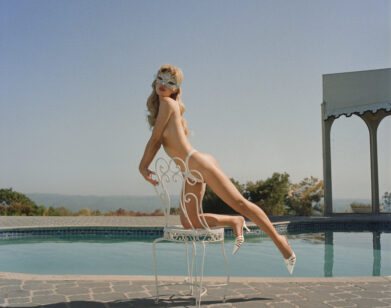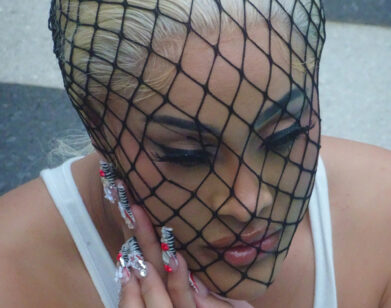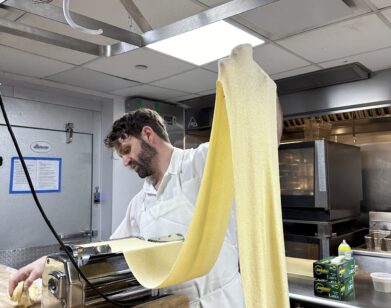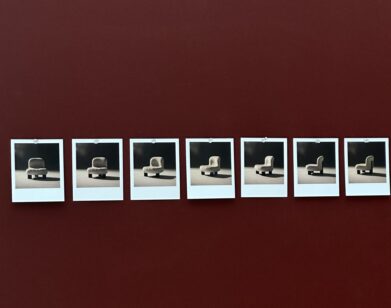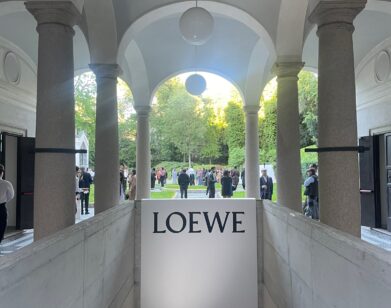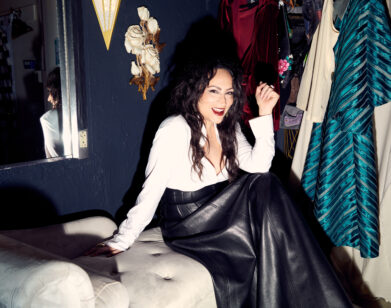Katie Dippold, The Superfan Behind Ghostbusters
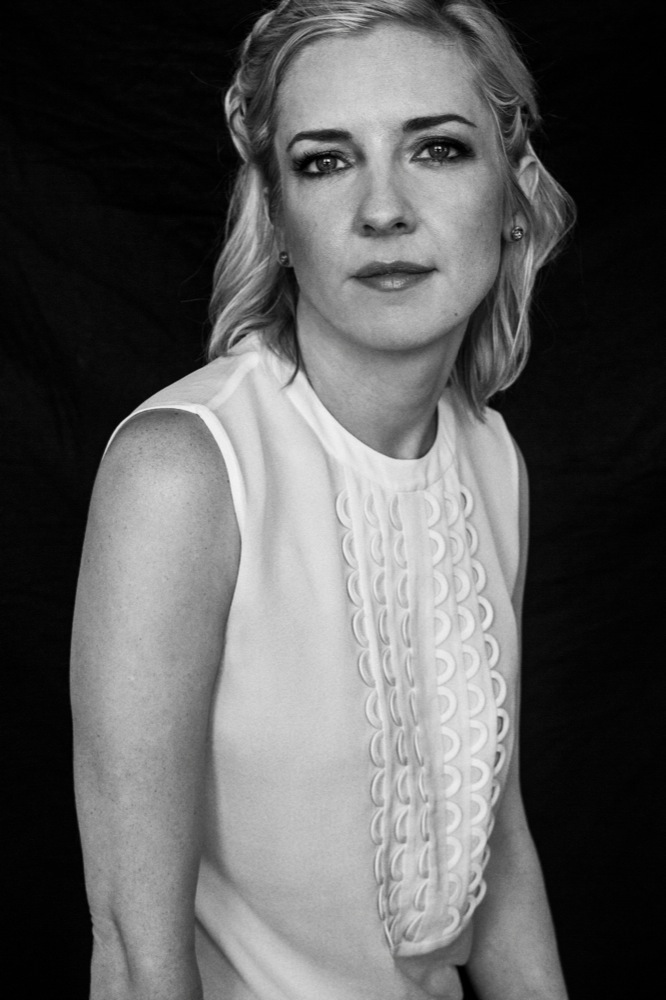
ABOVE: KATIE DIPPOLD IN NEW YORK, JULY 2016. PHOTO: VICTORIA STEVENS. HAIR AND MAKEUP: JESSI BUTTERFIELD/EXCLUSIVE ARTISTS USING TARTE COSMETICS.
When Paul Feig asked screenwriter Katie Dippold if she wanted to collaborate on an all-female Ghostbusters reboot, declining was not an option. “I immediately knew there was going to be a very high bar, but I just couldn’t say no,” she explains at the Sony offices in New York. The two had already worked together on Dippold’s first feature script, The Heat (2013), which she had written on spec while on the writing staff at Parks and Recreation. Starring Melissa McCarthy and Sandra Bullock, The Heat was a resounding success, both critically and commercially, and Feig and Dippold remained in touch. Re-imagining rather than remaking Ghostbusters appealed to Dippold as a fan of Ivan Reitman’s 1984 original film. “I love those characters so much,” she says. “I don’t want someone new to tell me what happened to Venkman or Egon,” she continues. “I always thought Paul’s idea of a reboot was protecting that legacy.”
Born in New Jersey, Dippold grew up worshipping Saturday Night Live and interned at Late Night with Conan O’Brien during college. “Watching those comedy writers work, that was my dream,” she explains. After flirting with the idea of joining the FBI (she didn’t get past the “Have you tried any drug more than three times?” question on the online application), she joined the Upright Citizens Brigade in New York and maintained a day job temping. When she landed a gig writing for MADtv, she relocated to Los Angeles. “Personally, advice I’d give to writers is if it’s one of those things that you can’t imagine doing anything else, then just do it,” she says.
Tomorrow, Ghostbusters comes out in theaters across the U.S. After completing the Ghostbusters press tour, Dippold will return to the set of her current project, a mother-daughter comedy starring Amy Schumer and Goldie Hawn.
EMMA BROWN: Have you been on set for all of the movies you’ve written so far?
KATIE DIPPOLD: Yeah, which is lucky. That’s not guaranteed. Once you finish the script, it’s no longer yours; it’s the other people making it, which sometimes can be hard. Paul, who’s a lovely, lovely, kind man, likes writers around. He’s always asking me to be on set. He’s very patient and I’ll write many long, passionate emails about things and he listens and agrees or disagrees. It’s been a really good process.
BROWN: Is being on set fun or weird?
DIPPOLD: It’s fun. It’s a mix. It can be stressful if I wrote something that I realize doesn’t sound right. I can write something at home and be like, “Great. Nailed it.” Then I’m like, “No one should have to say those words. That doesn’t make any sense.” It’s a lot of scrambling. You’re basically there to help the production. You’re helping the actors make it make sense, or helping Paul, or maybe you wrote something that doesn’t work in the production sense. Most of it is coming up with jokes. Paul likes having as many jokes as possible, so writing different things they can try. Or one of the actresses will come up with something and you’ll write to that, or if something really works you’ll make a runner of that. It’s constantly in motion. Paul does a lot of test screenings, so I’ll always see different versions. I get to see the process—I get why he makes the choices he does.
BROWN: When you agreed to write the film, what was the next step? Did Paul say, “Here are the kind of people I’m thinking of”? Did you have anyone in mind when you were writing the characters?
DIPPOLD: We talked about a bunch of people, which was hard since there were so many amazing people. Then he was having a tough time figuring out, so he was like, “Let’s just write the script. We’ll nail down four characters, see what the dynamics are, and after that see what makes sense.” In my mind there were people I kept picturing—I couldn’t help myself—but at the end of the day he just cast who he saw.
BROWN: When you’re writing an ensemble piece, do you ever get really wrapped up in one specific character? Are you ever tempted to favor one character over the others?
DIPPOLD: It happened one by one. It was a domino affect. First, I thought about how no scientist believes in the paranormal anymore. There are no parapsychology departments in colleges anymore. It’s different than it was back then. I thought, “Well, what if there’s a physicist who’s trying to prove herself at this prestigious university? What if in her past she wrote this book about the paranormal and she’s embarrassed about trying it?” That made me think, “What if she wrote that book with someone, her friend Abby, who she hasn’t seen in years and has been pursuing it this whole time? They have this rift.” Then, “Who’s working with Abby in this weird basement under a terrible college? It must be someone super crazy and outside the box. They don’t care about social norms.” That’s Holtzmann. For the final character, Patty, one thing I loved about the original was having this everyman, someone who wasn’t a part of this weird club. I relate the most to Patty. We thought of having someone who works for the MTA, which feels like iconic New York to us, and being able to see through her eyes going from that job to being thrown in this adventure.
BROWN: With a movie that’s so iconic like Ghostbusters, people expect you to reference the 1984 film. How do you keep the balance between fun winks to the original and going overboard?
DIPPOLD: That was the biggest debate. At the end of the day, [Paul and I] are both such superfans. We just really wanted to see all of those people again; it made our hearts happy. We really wanted to see Slimer again. I’m sure there are people who think we went overboard. I would totally get that. It was just a choice we made as superfans.
BROWN: Did you know which of the original cast members were going to be involved?
DIPPOLD: No. We knew that Dan Akroyd wanted to do something. After that it was just one by one asking each person. Bill Murray was very mysterious. We sent him the script and we didn’t know until the day before shooting if he was going to come or not. I don’t know what we would have done. [laughs] Someone on the crew would have had a real star turn.
BROWN: Do you like writing by yourself as opposed to being in a writer’s room?
DIPPOLD: I like a mix. With Paul, we’d meet and riff and bounce ideas back and forth, and then we’d go off on our own. We’re both introverts and we would write by ourselves. My friend John Reynolds, he’s also from Upright Citizens Brigade, years ago we wrote this movie and he’s probably the only person I felt comfortable sitting and writing with, because we were comfortable arguing. I remember one time I emailed him a draft and he wrote back with his notes in it. He wrote one in all caps: “WHY THE FUCK DID YOU CHANGE THIS? I’M GOING TO FUCKING KILL YOU!” [laughs] It sounds so crazy but it made me laugh out loud. I like that free spirit where you can laugh together and argue. I love a writer’s room. I miss Parks. I miss going in, joking around, eating lunch together, and laughing. But I also like going to my own computer and writing by myself.
BROWN: I know that you wanted to be in the FBI when you were little. Is that how The Heat came about?
DIPPOLD: Yes. It was just wish fulfillment. I feel like every movie has been wish fulfillment. For The Heat, I love Lethal Weapon. I watch it over and over again. I always wanted a friend like that; I always wanted to be the badass taking down the drug dealers. It was basically just writing what I wished I could be. Female friendship is so interesting to me. I often feel like when you make female friends as adults, it’s polite. I wish it was less polite and you could be frank and mess around with each other. I was at Parks and Rec and there was a new writer that came in, Chelsea Peretti. She was so funny. She would make fun of all of the guys and I’d laugh and think it was hilarious. Then she would turn and make fun of me. [laughs] I hadn’t experienced that kind of friendship. I remember once I saw a photo of a Hollywood Halloween party—Heidi Klum’s Halloween party—in a magazine. I referenced it and I was worried it sounded like I was there, so I said, “Oh, I wasn’t there.” Chelsea went, “No one thinks that. You’re fine.” I found it so refreshing, a new friend who just rips at you. That had a big affect on The Heat. I related to [Sandra Bullock’s character] Ashburn, who’s used to being more polite, and then [Melissa McCarthy’s character] Mullins is chiseling at her and calling her out on her bullshit.
BROWN: Do you come from a creative family?
DIPPOLD: Yeah. My dad has a very dry sense of humor and my mom has a more fun, silly sense of humor. My mom is the type that, at the dinner table, you’d look over at and she’d have a piece of asparagus hanging down her nose. Classic mom bit.
BROWN: Were you the funny one growing up?
DIPPOLD: I’d like to think so, but I think I was just a strange kid. I was definitely a weirdo. I ran a newspaper that had really dark stories all the time. My mom was always fun, she had this large box of costumes and I remember dressing up as a door-to-door saleswoman with a wig and this small suitcase I was using as a briefcase. I was walking down the street like that; I was sure I was fooling everyone.
BROWN: What were you selling?
DIPPOLD: Nothing. I had nothing to sell. I don’t know what I would have said if someone said, “Sure, what are you offering?” I didn’t think too far ahead. I’m surprised I wasn’t sent to therapy to be honest. I think my parents must have gotten a kick out of it.
GHOSTBUSTERS COMES OUT TOMORROW, JULY 15.

